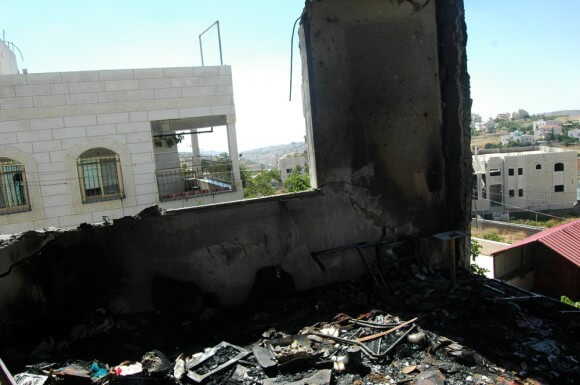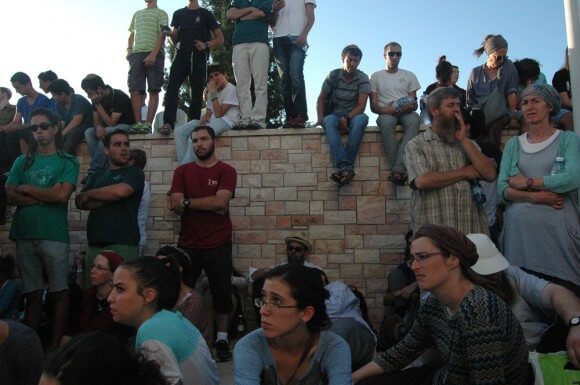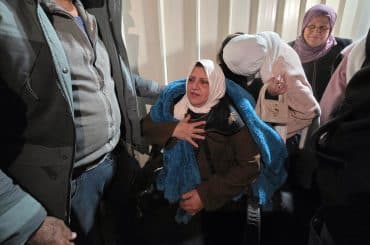
“There are not many Arabs driving with yellow plates,” said Mier Sh’aribi, 18, detailing his methods for flagging Israeli cars at the Gush Etzion intersection where three youths were abducted 19 days prior. Sh’aribi, an Israeli settler who lives in East Jerusalem, was hitching a ride to the funeral for the teens whose remains were found Monday evening in a field not 15 minutes from where he stood. In the two days since, the West Bank couldn’t be more chaotic: Israel has struck 34 targets in Gaza and reinstated the practice of punitive home demolitions, which had been abandoned after the second Intifada. But none of this mattered to Sh’aribi who said the kidnapping was not going to change his way of life. He will continue to attend religious school in Hebron. “Things happen, things happen here, things happen in houses, things happen everywhere,” he said.
Sh’aribi’s sentiments were echoed in the adjacent settlement of Beit Ayn, renowned as home to members of the Jewish Underground who were arrested while planting a bomb in a Palestinian girl’s school a decade ago. “This country has no more balls anymore and they are not killing enough Arabs,” said Reuven Efraimou, 17, while relaxing on a rock outside of the shabby settlement’s stone synagogue. Despite his age, he’s pelted Palestinians with stones admitting he “threw rocks at their heads” motivated by retaliation for the death of one of his friend four years ago. The army he said, “used to be on our side,” but now Efraimou thinks they only “protect Arabs.” He longed for a time when “not a single Arab would walk with their heads” held high knowing better than to “dare to look a Jew in the eye.”

The return of punitive home demolitions
Hours before the bodies of the abducted Israeli teens were unearthed on Monday and hundreds of soldiers set explosives to demolish units in homes belonging to men wanted in connection to the kidnapping, Baruch Mizrachi’s widow and children were in court. Israeli’s High Court was set to debate the return of an Intifada-era practice of punishing the family of those who kill, or are suspected of killing, Israelis. In this case, the accused, Ziad Awaad, has not yet been convicted for what has been called the “Passover Killing” near Hebron last spring, but that afternoon state attorneys presented to a three-judge panel a plan to use explosives to demolish the second story of his family home for carrying out the murder.
“What did I do, I live in Modiin,” said Hadas Mizrachi after the hearing, explaining her family was targeted while driving in the West Bank, “my children they will see it all of their lives. He ruined us.” Mizrachi’s death was a gruesome scene that left Hadas with two bullets in her back as she sped off under gunfire with her children in the car as her husband bled to death. The Mizrachi’s are not settlers and live inside of Israel’s 1967 borders and were hoping the court would rule to reinstate punitive home demolitions. “If a terrorist will see that Israeli is ruining houses down, they will think again, it will scare them,” said Hadas.
There is no gray area on the legality of punitive home demolitions. Razing the family home of a person suspected or convicted of a crime against the state is collective punishment. It condemns the relatives of alleged criminals to homelessness, which from Israel’s standpoint is an ultimate deterrent.
Court concluded Monday around 3:00 pm with the jurists stating that they would not make a decision on the return of punitive home demolitions for at least 12 hours. Yet before the court could rule, the Israeli army set combustibles on timers and exploded two second floor units in the homes of the Palestinian men wanted in connection to the kidnappings of the Israeli teens. Both Marwan Qawasmeh and Amar Abu Aisha went missing a day after the kidnappings took place. The army has yet to explain what is their role in the abduction.

Collective punishment in Hebron
According to the Qawasmeh and Abu Aisha families, Israel soldiers had been in and out of their homes all week. All of the men in the Qawasmeh family had already been arrested over the past two weeks, leaving only the women and children from the family present when their homes were destroyed.
The demolitions took place early Tuesday morning at 12:00 am. But before that the Israeli army moved the remaining members of the Qawasmeh and Abu Aisha families to a neighbor’s house and ransacked their homes.
“They said they were not going to explode the house,” said Husni Qawasmeh, 38, a designer in Hebron who is married to the sister of one of the wanted men. Husni spent yesterday touring journalists through the damage. Oddly, the army detonated explosives in the unit inhabited by the wanted man’s brother, but not in the wanted man’s unit. In fact, everything in every unit in both buildings were damaged as if a tornado had blown through just two houses in Hebron and left the rest of the city seemingly untouched.
Husni said the army had already been in the house every two or three days, usually treating the family respectfully. The children were pacified with small chocolates and then separated from the drama and turmoil of watching their older male relatives arrested. But Monday evening, she said there was a turn. Two muzzled dogs burst through their house, as soldiers took knives from the kitchen and used them as implements of destruction. Every sofa was overturned and broken. The children’s bedrooms looked like heaps of colorful trash. No visible floor just smashed furniture, toys, and clothes. Even the walls were taken out with a hammer the army left behind.

Similarly, in the Abu Aisha house where 20 live, everything that could be destroyed was destroyed. It’s hard to imagine that bare hands and small tools could be used to cause such damage, but considering hundreds of soldier were punching bedrooms, bathrooms and kitchen walls for hours the decimation is understandable.
The actual demolished sections of both houses were second floor units. The explosives the military used knocked out walls and part of the top floor’s ceiling. It was like someone took charcoal and just rubbed out one section of an idyllic house.
Meanwhile in the rest of Palestinian Hebron, residents are still reeling from two and a half weeks of an additional 2,000 Israeli soldiers stationed in the rural areas by day with routine incursions at night. Without a base to accommodate the influx of troops, Israeli forces sheltered themselves inside Palestinian schools and homes. When I visited Hebron last week, a different branch of the Qawasmeh family said that around 40 soldiers commandeered their home—forcing the 21 people who lived there into one room while the Israeli conscripts took naps on their couches and in their beds. Other soldiers were seen sleeping outside under the shade of olive orchards.

Funeral for symbols of a nation
By nightfall on Tuesday it seemed the whole of Israel was traveling to Modiin outside of Jerusalem for a joint funeral for the three abducted teens. Eyal, Gilad and Naftali have quickly become symbols for their nation; their faces were even printed onto stickers that covered the labels of water bottles handed out to the grieving.
Because of the size of the overwhelming crowds, Israeli police made some 100,000 mourners park buses and cars an hour’s walk from the cemetery. No one seemed to mind though, and many trekked kilometers through the hills to reach the burial site. As with many state functions, modern Orthodox youths were bused in from their schools, although a few armed mourners turned up as well. Still the bulk of the attendees pulled from the mainstream of Israeli society.
The tone of Prime Minister Benjamin Netanyahu’s remarks took a harder turn than the softness he had carefully adhered to since the beginning of the abduction. He vowed “revenge.”
“No matter where they hide, we’ll reach them until the last one and we’ll take our revenge,” he said, continuing, “We’ve already demolished homes,” referencing the demolition of the Qawasmeh and Abu Aisha houses, where at that very moment two families were condemned to living in rubble for the crime of being a relative to someone.

“We’ll expand the battle as much as needed,” said the Prime Minister, underscoring again Hamas as the culprit, despite any public disclosure of evidence of Hamas’s involvement. “Hamas is responsible, Hamas is paying a price and Hamas will continue to pay a price,” he promised. After Netanyahu concluded his speech, murmurs of boos could be heard from youth disaffected by his unwillingness to unfold an even heavier hand upon the Palestinians.
Next, Defense Minister Moshe Ya’alon revealed that from the very first day of the massive operation in the West Bank, Israeli intelligence sources knew where to focus the manhunt: “The Shin Bet are invisible and unheard. First day after the kidnapping they reached the unit that carried out the attack, and therefore made it impossible for them to make any demands.”
Ya’alon’s remarks hit at what’s been rumored among Palestinian and Israeli journalists since the kidnappings: the IDF operation was not a rescue mission, but a broad assault on whatever was left of Hamas in the West Bank. Since the kidnapping Israeli forces arrested over 500, fired missiles on Gaza, killed 10 (with two dying from heart attacks during home raids), and deployed soldiers in every major Palestinian city including Ramallah, the de facto capital of the Palestinian state in waiting. The sheer geographical expansiveness of the military activities made the entire operation seem like a fishing expedition. As well, many of the overnight blitzes on Palestinian institutions concluded without any arrests. At Bir Zeit University outside Ramallah, scores of soldiers packed up Hamas flags and banners, which all logic suggests were benign, although unwanted, decorations.
Opening a Pandora’s Box in Jerusalem
While Ya’alon and Netanyahu were speaking to mourners, another government politician was heading another memorial 20 minutes away. Former Knesset member and leading figure of Israel’s hard-right, Michael Ben-Ari, was hoisted to the shoulders of youths amid chants of “Death to Arabs!” in central Jerusalem. It was the second march of its kind since the bodies were found. The discovery seems to have opened a Pandora’s Box of xenophobia brewing inside of Jerusalem.
On most days the city is a tense melodrama of institutionalized inequalities with small acts of discrimination that go unnoticed. Stickers in Hebrew and Arabic pepper business windows in the shopping district warning Arabs to not even look at a Jewess; someone gets shoved, someone gets cursed out. But now the negotiated truce on agitation is over. Hours after the “death to Arabs!” parade, an Arab was killed.
Early this morning the body of Mohammed Hassan Abu Khdeir, 17, was found by Israeli police in a field in West Jerusalem. The teen was murdered after being “pulled into a vehicle and possibly kidnapped,” police spokesman Inspector Micky Rosenfeld told Reuters. And so as the West Bank might finally be cooling, attention turns to Jerusalem.


The home demolition is sickening. What is the point ?
Meanwhile, in a planet of faraway logic
http://www.haaretz.com/jewish-world/jewish-world-news/.premium-1.602675
“The secretary-general of World Bnei Akiva, Rabbi Noam Perel, called for revenge of the kidnapping and murder of three Israeli teens, the bodies of whom were found Monday. “An entire nation and thousands of years of history demand revenge,” Perel posted on his Facebook page, shortly after the bodies were found.
“The government of Israel is gathering for a revenge meeting that isn’t a grief meeting. The landlord has gone mad at the sight of his sons’ bodies. A government that turns the army of searchers to an army of avengers, an army that will not stop at 300 Philistine foreskins,” Perel wrote, alluding to the biblical tale of David, who killed 200 Philistines and gave their foreskins to King Saul as the bride price for his daughter.
“The disgrace will be paid for with the blood of the enemy, not with our tears,” Perel concluded. Perel posted the same message in a Facebook group of World Bnei Akiva envoys. ”
“Perel, 44, has been the secretary-general of World Bnei Akiva since 2012. A Zionist-religious youth movement, World Bnei Akiva has over 150 branches in dozens of countries worldwide. According to the movement’s website, it is dedicated to fighting “intermarriage and social assimilation” by encouraging immigration to Israel, by “deepening Jewish identity” and by “strengthening and connecting the Jewish nation abroad to the values of religious-Zionism and the state of Israel.”
Marvellous
Netanyahu and his government incited the ugliest to form a mob.
“After Netanyahu concluded his speech, murmurs of boos could be heard from youth disaffected by his unwillingness to unfold an even heavier hand upon the Palestinians.”
These booing “youth” have no real future, then. Any adult who incites the youth of any country to seek revenge and engage in retribution is to blame– and that includes PARENTS.
“Defense Minister Moshe Ya’alon: ‘First day after the kidnapping [the Shin Bet] reached the unit that carried out the attack, and therefore made it impossible for them to make any demands.’”
Is this an admission that the kidnappers’ original plan was to obtain bargaining chips for the release of Palestinian prisoners? By deliberately thwarting that plan the Shin Bet triggered the killings. They must have realized there was a high risk of that being the result of their action. And presumably they acted under orders from Netanyahu.
Wow, the people around here. I don’t see how we can come to any conclusions until Yonah Freedman and Hophmi, and DaBakr and the rest come and explain it to us.
Am I seeing things, or there are some settlers asking for The Final Solution to the Palestinians?